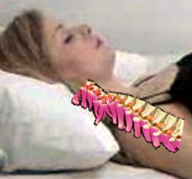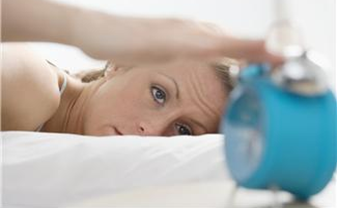Neck Pain and headaches upon waking are caused by either poor sleeping posture or Stress.
If you don’t get these two things right, you are making your neck more unhealthy and more susceptible to injury EVERY night!
First, Correct Posture is critical. Here’s the short version. Sleep on your side, with a pillow between your legs and a pillow holding your neck in alignment or on your back with a pillow supporting your natural neck curve.
On Your Back – Let’s make it easy for you. In this position, the key is to support the natural curve in your neck and avoid lifting your head like we see in the picture to left — which would stress the curve out of your neck. You can support the curve with a contour pillow, neck roll, or wadding up a part of your pillow or towel (lower picture).
On Your Side – This allows you to use almost any pillow on the market to support your head and neck at the same time. Too small or no pillow, as in the left picture here, causes neck strain. Neck Twisted – When people say they sleep on their stomach or face down, what they mean is neck turned with face left or face right. As in this picture, the neck (and jaw) will be torque to one side to allow you to
breathe. For a few minutes, that is fine, but over hours, this deforms soft tissues of the neck and occasionally pulls ribs out of joint. This is why you wake with a stiff neck. If it’s simply a stiff neck, it is from strained/deformed ligaments/discs or ribs that pulled out and relocated. These high ribs are the anchor point for some neck and shoulder muscles. This is how rib can cause pain, tingling, & dysfunction in both neck and arm.
Second, a Relaxed Mind may be the answer. Often people do not even know they are stressed, but if you wake with a headache or a stiff jaw, it is likely stress. What happens is that we try to solve problems while we are sleeping. We clench our teeth, because this is our way of concentrating or focusing more on an issue. The TMJ (temporomandibular joint) and surrounding muscles are LOADED with nerve receptors. So, clenching our teeth does actually stimulate our brain powerfully, but if we do this hours at a time during the night, this muscle tension causes waste products to build up in the jaw muscles. Excess waste products form a toxic trigger point that can refer pain behind the eyes or to the temples. The solution, relax for 30 minutes before bed (no TV, news, or exciting reading), lay on a heating pad, do “Diaphragm Breathing” and “Progressive Relaxation.”





